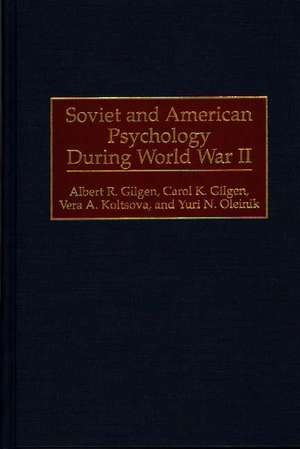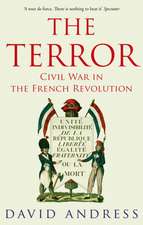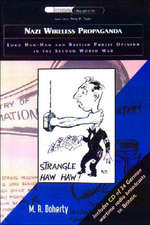Soviet and American Psychology During World War II: International Contributions in Psychology
Autor Albert R. Gilgen, Carol K. Gilgen, Vera Koltsova, Yuri Oleiniken Limba Engleză Hardback – 29 oct 1997 – vârsta până la 17 ani
Din seria International Contributions in Psychology
- 28%
 Preț: 497.64 lei
Preț: 497.64 lei - 27%
 Preț: 441.29 lei
Preț: 441.29 lei - 28%
 Preț: 460.60 lei
Preț: 460.60 lei - 28%
 Preț: 375.31 lei
Preț: 375.31 lei - 38%
 Preț: 346.50 lei
Preț: 346.50 lei - 28%
 Preț: 460.51 lei
Preț: 460.51 lei - 24%
 Preț: 364.22 lei
Preț: 364.22 lei - 28%
 Preț: 344.22 lei
Preț: 344.22 lei - 27%
 Preț: 438.93 lei
Preț: 438.93 lei - 27%
 Preț: 438.24 lei
Preț: 438.24 lei - 28%
 Preț: 435.88 lei
Preț: 435.88 lei - 28%
 Preț: 434.61 lei
Preț: 434.61 lei - 24%
 Preț: 459.31 lei
Preț: 459.31 lei - 22%
 Preț: 471.24 lei
Preț: 471.24 lei - 28%
 Preț: 344.22 lei
Preț: 344.22 lei - 27%
 Preț: 345.67 lei
Preț: 345.67 lei - 18%
 Preț: 308.13 lei
Preț: 308.13 lei - 28%
 Preț: 436.15 lei
Preț: 436.15 lei - 30%
 Preț: 512.04 lei
Preț: 512.04 lei - 24%
 Preț: 464.13 lei
Preț: 464.13 lei - 27%
 Preț: 438.59 lei
Preț: 438.59 lei - 27%
 Preț: 464.48 lei
Preț: 464.48 lei - 38%
 Preț: 345.15 lei
Preț: 345.15 lei - 27%
 Preț: 438.76 lei
Preț: 438.76 lei - 28%
 Preț: 437.47 lei
Preț: 437.47 lei - 14%
 Preț: 356.95 lei
Preț: 356.95 lei - 38%
 Preț: 437.47 lei
Preț: 437.47 lei - 38%
 Preț: 345.30 lei
Preț: 345.30 lei - 35%
 Preț: 363.73 lei
Preț: 363.73 lei - 27%
 Preț: 438.33 lei
Preț: 438.33 lei - 28%
 Preț: 437.57 lei
Preț: 437.57 lei - 24%
 Preț: 458.91 lei
Preț: 458.91 lei - 33%
 Preț: 174.88 lei
Preț: 174.88 lei - 27%
 Preț: 364.06 lei
Preț: 364.06 lei - 17%
 Preț: 289.84 lei
Preț: 289.84 lei
Preț: 463.38 lei
Preț vechi: 708.53 lei
-35% Nou
Puncte Express: 695
Preț estimativ în valută:
88.67€ • 92.82$ • 73.37£
88.67€ • 92.82$ • 73.37£
Carte tipărită la comandă
Livrare economică 07-21 aprilie
Preluare comenzi: 021 569.72.76
Specificații
ISBN-13: 9780313287947
ISBN-10: 0313287945
Pagini: 264
Dimensiuni: 156 x 235 x 23 mm
Greutate: 0.59 kg
Ediția:New.
Editura: Bloomsbury Publishing
Colecția Praeger
Seria International Contributions in Psychology
Locul publicării:New York, United States
ISBN-10: 0313287945
Pagini: 264
Dimensiuni: 156 x 235 x 23 mm
Greutate: 0.59 kg
Ediția:New.
Editura: Bloomsbury Publishing
Colecția Praeger
Seria International Contributions in Psychology
Locul publicării:New York, United States
Notă biografică
ALBERT R. GILGEN is Professor of Psychology at the University of Northern Iowa. He is a Fellow of the American Psychological Association, the American Psychological Society, and the American Association of Applied and Preventive Psychology. His publications include: American Psychology Since World War II: A Profile of the Discipline (1982), International Handbook of Psychology (coedited with Carol K. Gilgen, 1987), and Chaos Theory in Psychology (coedited with Frederick David Abraham, 1995), all from Greenwood Press.CAROL K. GILGEN is a certified public accountant. She is coeditor with Albert R. Gilgen of International Handbook of Psychology (Greenwood, 1987).VERA A. KOLTSOVA is Head of the Laboratory of the History of Psychology and Historical Psychology of the Institute of Psychology of the Russian Academy of Sciences.YURI N. OLEINIK is Dean of the Faculty of Psychology of the Youth Institute in Moscow and Senior Scientist of the Laboratory of the History of Psychology and Historical Psychology of the Institute of Psychology of the Russian Academy of Sciences.The editors also collaborated on Post-Soviet Perspectives on Russian Psychology (Greenwood, 1996).
Cuprins
PrefaceSoviet Psychology During World War IISoviet Psychology during the Pre-World War II PeriodThe Reorganization and Development of Soviet Psychology in Accordance with the Demands of the WarSoviet Psychologists' Wartime Research and Applied ActivitiesAmerican Psychology During World War IIPsychologists Organize and Plan for the War EffortPsychologists and the Military EnterprisePsychologists' Other Wartime ResearchThe War and Postwar PsychologyGeneral Conclusions and Comparative CommentsThe Russian PerspectiveThe American PerspectiveAppendix: Chronology of Major Events During World War II (Russian Perspective)Index
















